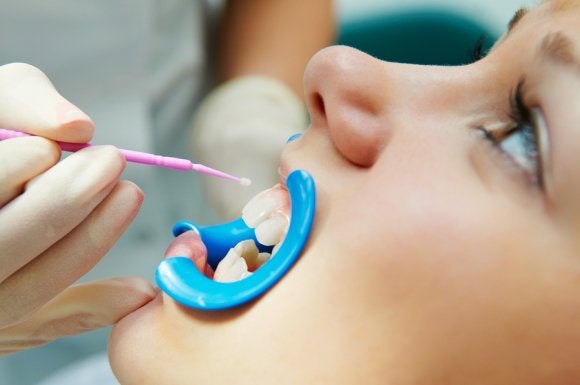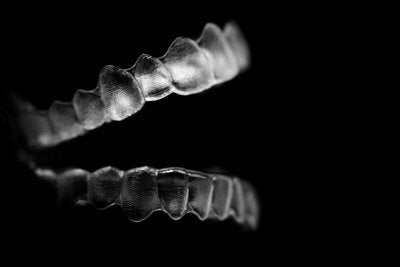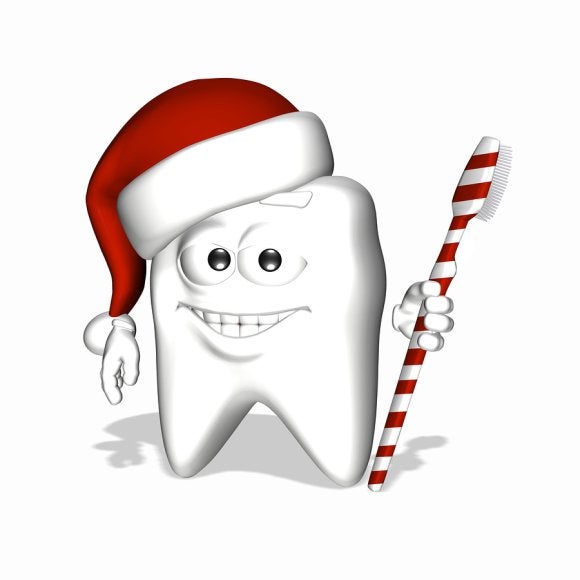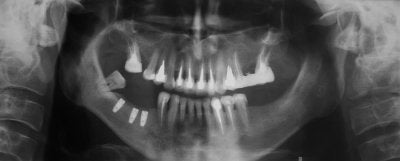-
Reasons to Choose Invisalign
Teenagers and adults have many options for getting a straighter smile. While braces in Bel Air are a common choice, more and more patients are asking their dentists about Invisalign. Invisalign offers a number of benefits that traditional braces cannot match. This article will highlight just some of the reasons you should pick Invisalign to achieve your

perfect smile.
The Aligner Trays Can Be Removed
Unlike traditional braces, which do not come off for the entire duration of treatment, Invisalign aligner trays do not need to be worn 24 hours each day. Since you can remove the trays at mealtimes, it means that Invisalign has no food restrictions. You do not have to make any modifications to your diet or worry about food getting stuck in between wires and brackets. Instead, trays can simply be removed and put back once mealtime is over. This also means that your dental hygiene routine of brushing and flossing can continue normally throughout your orthodontic treatment, leaving you less susceptible to gum disease.They Are Virtually Invisible
Many adults are hesitant to seek orthodontic treatment for crooked teeth, as they are worried about their appearance. Since Invisalign aligner trays are made from a clear plastic, and are custom made to fit directly over your teeth, they are virtually invisible. In fact, most people will not even know you are wearing Invisalign—unless you tell them.It is Effective
Invisalign works by utilizing a series of custom made aligner trays. These trays are made to match the treatment plan predetermined by your orthodontist to map out all movement of your teeth. The trays are swapped out every couple of weeks, meaning you can see the changes to the alignment of your teeth throughout treatment. In most cases, treatment with Invisalign accomplishes desired results in less time than traditional braces.It is More Comfortable
One of the biggest complaints about traditional braces is that they can be uncomfortable, and at times even painful. Invisalign is comfortable to wear, and most of the time, you won’t even notice the aligner trays are there! -
What Is Your Sensitivity Saying About Your Teeth? [INFOGRAPHIC]
Do hot, cold, and sweet foods send an unwelcome jolt through your mouth? If so, you could be suffering from sensitive teeth. Tooth sensitivity occurs when the gums retract, exposing the dentin, which provides a straight path to the nerves in your teeth. Extreme temperatures and high-sugar foods trigger those nerves and cause a searing, painful sensation. Tooth sensitivity isn’t a dental health problem in itself but is rather a symptom that should be evaluated by your dentist if it persists. While some cases of sensitivity are easily addressed by changing toothbrushes, other cases are associated with decay and disease that should be treated by your dentist. Learn more about tooth sensitivity in this infographic from Your Smile . Our dentist in Bel Air, MD provides comprehensive oral health care, including dental implants, cosmetic dentistry, and tooth extraction. Contact us to set up an appointment, and please share this information with your friends and family.

-
Oral Health During Pregnancy
If you are pregnant or plan on becoming pregnant soon, you can expect many changes in your life. In addition to making room in your home for your new family member, you’ll be making many appointments to make sure your health is in good order. This includes calling your dentist in Bel Air, as pregnancy can cause changes in your oral health. Watch this video to learn more about how your dentist can help you maintain good oral health during pregnancy .
As your dentist can tell you, pregnant women may notice that their gums are more sensitive or bleed more easily during the first few months of pregnancy. This is known as pregnancy gingivitis, and is a relatively common occurrence. You should brush your teeth twice per day and floss every day, taking care to use a fluoride toothpaste and a toothbrush with soft bristles, to prevent gingivitis and gum disease. Your diet is important during pregnancy both for you and your growing baby. Go for a variety of fruits, vegetables, and dairy products, and try to minimize your sugar intake to keep your mouth and body healthy.
-
Risk Factors for Gum Disease
Everyone wants to have a beautiful smile full of healthy, white teeth. However, there’s more to oral health than just having a bright smile. In addition to visiting your dentist near Bel Air every six months, you should brush your teeth twice per day and floss on a daily basis. This combination of professional and at-home oral care will help keep tooth decay and gum disease at bay. Gum disease can be painful and damaging to your oral health, as it could lead to tooth loss if it is left to progress unchecked. Keep reading to learn about the risk factors for gum disease and what you can do lower your risk.
Age
While there are some risk factors for gum disease that you and your dentist can control, there are others that you just can’t. As you grow older, you are at a greater risk for gum disease. According to the Centers for Disease Control and Prevention, over 75 percent of people in the U.S. ages 65 and older have gum disease. Make sure that you are visiting your periodontist regularly if you have a history of or signs of gum disease.
visiting your periodontist regularly if you have a history of or signs of gum disease. Smoking
It is widely known that smoking and using other forms of tobacco is dangerous for your health, and your oral health is no exception. Smoking greatly increases your risk of periodontal disease, and using tobacco can exacerbate any gum disease that is already present. Additionally, if you continue to smoke, it will be much more difficult to treat gum disease in a successful manner.Genetics
If you have a family history of gum disease, you may be at a greater risk of developing it yourself. That’s why it’s important to discuss your medical history with your dentist, as a preventive treatment plan can help lower your risk of gum disease.Stress
Stress can take a physical toll on your body as well as mental and emotional tolls. Studies have shown that high levels of stress make it harder for your body to fight off infections, which can include periodontal disease. Work on reducing your stress levels to improve your oral health as well as your overall outlook. -
The Importance of Sealants
Your teeth are designed to last a lifetime, but you should still do what you can to protect yourself against gum disease, tooth decay, and other oral health problems. During your next visit to your dentist in Bel Air, find out what you can do to keep your oral health in good condition. Your dentist may recommend sealants if you do not already have them to protect your teeth against decay. Sealants are used on the chewing surfaces of molars, helping to seal off the pits and grooves in your teeth against plaque, tartar, and decay. They make the surfaces of your teeth smoother and easier to clean, and help prevent bacteria from building up in those pits. Your dentist or dental hygienist can apply sealants in a short, painless procedure. The sealant material will be painted onto your teeth, and then either harden on their own or be cured by a special light. After you get your sealants, you’ll have additional protection against decay, but you should still practice a good at-home oral care routine to ensure a happy, healthy smile.

-
Conditions That Invisalign Can Treat
When you look at your smile in the mirror, do you notice that your teeth could use some improvements? If you have teeth that are misaligned, it could have a negative effect on your oral health as well as your aesthetic appearance. When you’re ready to correct your smile, talk to your dentist in Bel Air about your options for orthodontic treatment. Invisalign is a discreet alternative to traditional metal braces, as the smooth plastic aligners are practically invisible. Invisalign can help correct a number of different alignment issues. Read on to learn more.
Gapped Teeth
If you have sizeable spaces in between some or all of your teeth, Invisalign may be able to help treat this. Gaps can be caused by the way the jaw bone grows, or by missing teeth since remaining teeth will shift in their absence. Even if gapped teeth do not present an aesthetic concern for you, the extra space leaves your gums more vulnerable to periodontal disease. Normally, the gums are protected by the teeth, but with gaps, there is less of a barrier between the gums and disease-causing bacteria.
periodontal disease. Normally, the gums are protected by the teeth, but with gaps, there is less of a barrier between the gums and disease-causing bacteria. Overbite
Overbite, or overjet as it’s known to your dentist, refers to when the upper teeth protrude abnormally far in front of the lower teeth. It can be caused by genetics, bone development, or oral habits. An overbite can cause excess wear on the lower teeth as well as jaw problems that can be quite painful. Invisalign can often help correct an overbite.Open Bite
Open bite occurs when teeth don’t make contact when the jaw is completely closed. This may be a result of thumb-sucking, or genetics. If you have an open bite, you may experience problems speaking, or trouble chewing your food thoroughly. Since it can also lead to jaw disorders, Invisalign is a good choice to help correct this misalignment.Crowded Bite
If you do not have enough room in your jaw for all of your teeth, you may have crowded teeth. Your dentist may recommend extraction in order to make room for everything, or use Invisalign to help prevent your teeth from growing into a more crooked, misaligned position. -
Screening for Oral Cancer
Did you know that approximately 42,000 new cases of head and neck cancer are diagnosed each year? 65% of these begin in the oral cavity, which is why dentists in Bel Air recommend regular screening for oral cancer.
Regular visits to the dentist are essential for early oral cancer detection. During your bi-annual check-up, your dentist will conduct a preliminary screening to look for any abnormalities. About 10% of patients have a flat, painless white or red spot or a small sore on the inside of the mouth. Testing can determine if this spot is harmless or cancerous. Your dentist may take tissue for checking or send you to a specialist. Because many of these spots and tooth abscesses may be visible only to your dentist, it is vital to visit your dentist’s office, especially as you get older.
-
When Is a Root Canal Necessary?
There are a number of reasons you may need a root canal near Bel Air . A root canal is a procedure performed by a dentist to remove the tooth nerve. The procedure is done to save a tooth that has become infected or shows signs of bad decay. It may not always be immediately apparent when a root canal is necessary. This article will highlight some of the more common reasons a root canal would be required.
When Tooth Pain is Present
Not all tooth pain is a reason to have a root canal, but pain is a major indicator that something is wrong. If the pain is present when eating or when pressure is applied, it could be indicative of nerve damage. Extra sensitivity or pain to hot and cold is also a sign of nerve damage. If a tooth that is infected or badly decayed causes the pain, a root canal will need to be performed to stop the pain.
present when eating or when pressure is applied, it could be indicative of nerve damage. Extra sensitivity or pain to hot and cold is also a sign of nerve damage. If a tooth that is infected or badly decayed causes the pain, a root canal will need to be performed to stop the pain. If a Tooth has Become Abscessed
If a tooth that is infected is left untreated, an abscess will form. An abscess is a pocket of puss that forms in the tooth. An abscessed tooth can spread to other teeth and gums, furthering the infection. While it may or may not cause pain, an abscessed tooth is usually visually noticeable. The puss pocket that forms has an appearance similar to that of a pimple. Some patients with an abscessed tooth may even notice puss oozing from the affected area. A root canal is necessary to repair the abscessed tooth.When a Tooth has Been Damaged
Any time a tooth is damaged and the nerve is affected, a dentist will likely perform a root canal. In the event of trauma to the tooth, such as being hit in the face with enough force to damage a tooth, the nerve can be severed. If this happens, a root canal can be performed to fix the nerve. -
What to Expect When You’re Getting a Crown
Have you ever wanted to improve the way your teeth look? If so, one of the options to consider is to get crowns near Bel Air . Crowns are made of porcelain and are used as a cap on a tooth to fix a number of dental issues, from cosmetic to restorative. Dental crowns are used to alter the shape, size, and color of a tooth. They are custom made to fit your smile. A dentist will recommend crowns if you are looking to alter the appearance of your tooth, or as a way to cover up a filling.
When you get a dental crown, the first step is to create the molding so that your crown is custom made to fit your needs. While the crown is being made, a temporary crown will be used. It usually takes about two weeks for your crown to be completed. A second appointment with your dentist will entail removing the temporary crown and placing the custom fit crown. Your dentist will schedule follow up visits periodically to check in on your crown.

-
Inside the Dental Implant Procedure
After losing a tooth, or multiple teeth, you may want to consider dental implants near Bel Air . Dental implants are used in place of a missing tooth, as an artificial root for a new crown or bridge to fill in any gaps in your smile. An implant is surgically placed by a dentist and attaches to the existing bone. For more information about the procedure, continue reading this article.
Considering Surgery
If you have a missing tooth, you may be wondering if you are a candidate for surgery. Dental implant recipients are generally in good overall health. Since dental implants are most successful when they are able to easily integrate with the jawbone, it is best when recipients have healthy gum tissue, free of periodontal disease.
Placing the Implant
The dental implant procedure actually consists of multiple surgeries. The first surgery is the procedure to insert the implant into the gum. A dentist will make an incision in the gum to expose the bone and correctly place the implant in the gum. At this time, the implant will begin to fuse together with the bone as the incision heals. This keeps the implant in place.Placing the Abutment
Once healing is complete, usually after about six months, the dentist will make another incision to expose the implant. The dentist will inspect the implant to ensure proper healing and placement. At this time, the abutment will be attached to the top of the implant. This is the piece that will connect the implant to the crown or bridge. The second component of the procedure takes less time, and healing time is quicker as well. In some cases, a dentist or oral surgeon may opt to place the implant and abutment at the same time.Caring for a Dental Implant
Once the gums have healed and the implant is in place, a crown or bridge will be placed. This completes the dental implant procedure. To care for a dental implant is no different than caring for the rest of your teeth. Regular brushing, flossing, and dental cleanings will keep your dental implant healthy.
categories
- Uncategorized
- General Dentistry
- Toothache
- Emergency Dentistry
- Family Dentistry
- Receding Gums
- Cosmetic Dentistry
- Veneers
- Gum Disease
- Gingivitis
- Dental Crowns
- Orthodontics
- Dental Implants
- Root Canal
- Wisdom Teeth
- Teeth Whitening
- Your Smile
- Composite Fillings
- Lumineers
- Dentures
- Invisalign
- BrightSmile
- Dental Bridge
- Abscessed Tooth
- Sealants
